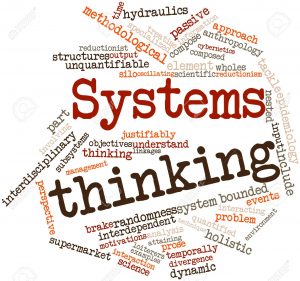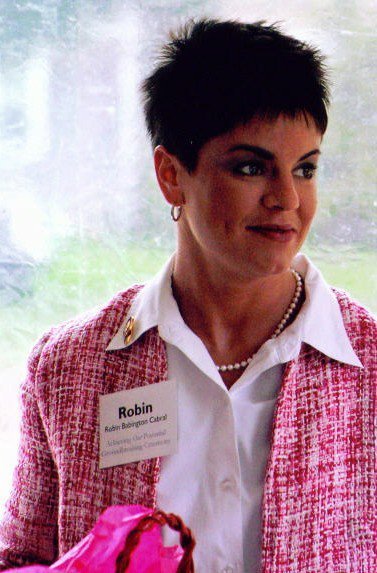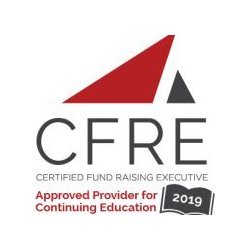Interestingly enough, I met with a wonderful and highly intelligent gentleman this past week. As we were eating lunch, we started talking about systems thinking. It reminded me of a mentor who once said that we needed to be reading people like Peter Senge.
I could never really make the correlation between Peter Senge’s highly complex writings and my practical work as a fundraiser. But, during this recent conversation, the dots began to connect.
You see, Peter Senge outlines the whole concept of what systems thinking is and how to frame it within your work. It made me think of my clients.
Systems thinking, at its broadest level, believes in the interrelatedness of forces and seeing them as part of a collective process. Peter Senge notes that it was Professor Jay Forrester at MIT who outlined the nature of “system dynamics” or how complex feedback processes can generate problematic patterns of behavior within organisations and large-scale human systems. Think eco-systems, physical building systems, teams working together, etc.
For many organisations, they have the basic problem of not having enough. – enough resources, time, staffing, etc. For some reason or other, they just can’t seem to rise above the realities of this problem. They go on in endless circles always seeming to address the same issue. For many, the problem may be that they have been relying on grants and foundations to meet their budget, and they never seem to have enough, or a funding source suddenly stops funding them. For others, there fundraising has plateaued or even declined over the past few years. Others face continuing turnover in fundraising staff. I see these same problems over and over again in different organisations.
Truly, what we all must realize is that a fundraising problem is never really a fundraising problem. It is some other underlying organisational problem impacting how well an organisation can conduct fundraising. We cannot begin to isolate a fundraising problem as just a fundraising problem. It is much more than that.
organisations are living, breathing entities. One thing impacts the other which in turn impacts another. Everything in an organisation is interrelated. So when, one is under stress, it has a direct bearing on the strength of the other. Nothing works in isolation.
Sometimes old models are kept in place far too long. Outdated and problematic mental models keep perpetuating cycles of behavior that impact the entire system.
Some systems that an organisation should be looking at beyond fundraising itself:
- The board of directors and its governance model.
- Staffing patterns and their compensation and their incentives.
- Deeply held organisational assumptions and beliefs.
- Performance expectations both implicit and explicit.
- Cultures within organisations.
- Changing demographics within the community that an organisation serves.
- Demographic changes within populations of donors.
- Marketing or lack of marketing efforts along with general overall perceptions of organisation.
- Physical conditions of facilities.
- The overall financial and economic environment.
A savvy fundraiser and fundraising consultant will understand these dynamics. One knows in most cases that if a Board of Directors is managing the efforts of staff, then fundraising will be impacted. If employees are not given the tools or resources to be able to do their job, then fundraising is affected. If expectations are unrealistic, fundraising is affected.
When clients present themselves to me with a fundraising problem, I often dig deep with questions. Because often and in most cases, the solutions that the client thinks they need are the ones not needed. The answer lies deep below the surface, and it takes someone versed in the language of systems thinking to be able to conduct an appropriate diagnosis and to outline a roadmap for making that systems change possible.
The consultant or fundraiser must be skilled at this work, for one should not make a change just because they see a leverage point. The amount of change, the type of change, and the scope of the modification proposed can either create the needed change or in some cases further exacerbate the problem.
So, for that gentleman who I was having lunch with, thank you! It behooves us all to have such strong mentors in our work from a multitude of disciples beyond fund development. Broadening our scope of resources allows us to care more holistically for the organisations that we steward.

 governance just by mear fact of the topics, the order of the items, and those responsible for reporting.
governance just by mear fact of the topics, the order of the items, and those responsible for reporting.
 So, many months ago, I set out and found a hill. I went up and down that hill over and over again. Then, searching online, I found mountain races. And, I entered them. And, I began running up to the summits of mountains. First smaller ones, and then larger ones. But, nothing greater than 3,000 or so feet.
So, many months ago, I set out and found a hill. I went up and down that hill over and over again. Then, searching online, I found mountain races. And, I entered them. And, I began running up to the summits of mountains. First smaller ones, and then larger ones. But, nothing greater than 3,000 or so feet. ith fundraising? Well, a great deal. Courage. I honestly believe that the most significant characteristic of a fundraiser is courage. These exceptional individuals know that even in the most difficult times, perseverance is key, and that “this too shall pass.” Courage to get a lot of “no’s” and to be able to ask for a gift without hesitation. It is the ability to do this, with rumblings and butterflies floating around in your tummy.
ith fundraising? Well, a great deal. Courage. I honestly believe that the most significant characteristic of a fundraiser is courage. These exceptional individuals know that even in the most difficult times, perseverance is key, and that “this too shall pass.” Courage to get a lot of “no’s” and to be able to ask for a gift without hesitation. It is the ability to do this, with rumblings and butterflies floating around in your tummy.

 messages that I subconsciously learned about money, and they helped to develop my now adult relationship with it.
messages that I subconsciously learned about money, and they helped to develop my now adult relationship with it. disclosure, like other more traditionally recognized stimuli, may be inherently
disclosure, like other more traditionally recognized stimuli, may be inherently  your territory. Use facial gestures that indicate happiness, open up your chest area, use hands to illustrate your words, etc.
your territory. Use facial gestures that indicate happiness, open up your chest area, use hands to illustrate your words, etc. When I surmise this is the case, I often ask, “Have you asked your donors?” And, the response is “No, how do you ask them?”
When I surmise this is the case, I often ask, “Have you asked your donors?” And, the response is “No, how do you ask them?” average of twenty cents per dollar raised to renew donors via direct mail? It costs about $1 to $1.25 to acquire a donor using that same method. That is five times more. And, on the converse, these new donors tend to give substantially less. It is much easier to upgrade an existing loyal donor to a higher level of giving.
average of twenty cents per dollar raised to renew donors via direct mail? It costs about $1 to $1.25 to acquire a donor using that same method. That is five times more. And, on the converse, these new donors tend to give substantially less. It is much easier to upgrade an existing loyal donor to a higher level of giving.


